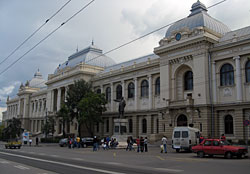Through collaboration between the University of Central Florida’s (UCF) Nanoscience Technology Center (NSTC) and the Florida Solar Energy Center (FSEC), a group of researchers from both UCF institutes will travel to Romania in June 2009 to participate in a five-day workshop exploring new developments in nanoscience and solar energy. The goal of this workshop is to formulate ideas about how to stimulate and give direction to future research collaborations between Romanian and UCF research teams.
Romania was chosen as the site for this workshop because of its potential for success in the nanoscience
field – the study of materials on a molecular or atomic scale – and UCF has had an ongoing interest in international collaborations, especially with Romania.

As a new member of the European Union, Romania committed at least one percent of its gross domestic product to scientific research and development, and has pursued an aggressive campaign to equip its economy and workforce for new opportunities in the technology industry. This workshop, funded by the U.S. National Science Foundation (NSF), will pave the way for Romania to leverage its existing expertise in medicine, physics, and chemistry as the country builds upon its scientific structure.
Romania has formed many operational research centers that have modern equipment, most notably the Center for Applied Research in Physics and Advanced Technologies (CARPATH). During this workshop, the UCF research teams will work with CARPATH to gain information on a group of projects being pursued by the NSTC and FSEC that require competency in computational modeling that only CARPATH can provide. In return, UCF’s NSTC and FSEC will utilize their strong experimental capabilities to explore the effectiveness of CARPATH’s computational platform for modeling existing experimental changes during this workshop.
Keynote speakers for this workshop include Dr. Mihail C. Roco, chair of the National Science and Technology Council’s subcommittee on Nanoscale Science, Engineering and Technology (NSET) and Senior Advisor for Nanotechnology at the NSF, as well as Dr. Gheorghe Popa, the former president of the “Alexandru Ioan Cuza” University, Iasi in Romania and former State Secretary for research at Romania’s Ministry of Education and Research.
UCF’s James Hickman, Founding Director of the NSTC, is one of the co-leaders for this workshop in the U.S., while Alexander Stancu, the Director of the Center for Applied Research in Physics and Advanced Technologies (CARPATH), will coordinate this collaboration in Romania. Hickman will receive assistance coordinating the workshop from Jeff Anderson, Associate Director of the NSTC, and two Romanian nationals of the UCF faculty Dan Marinescu, a professor and prominent researcher, and Nicoleta Sorloaica-Hickman, an assistant professor at FSEC with a joint appointment at NSTC and former student of Stancu.
“At FSEC, we need to utilize more opportunities for collaboration with other UCF professors,” said Sorloaica-Hickman. “They are an excellent resource, and this workshop will provide an opportunity to establish and nurture more professional relationships between the two institutions.”
There have been a number of interactions between UCF and Romanian-based research groups. UCF professors Hickman and Sorloaica-Hickman traveled to Romania in 2006, 2007, and 2008, making scientific presentations at the University of Iasi, University of Bucharest and University of Cluj Napoca – the three largest universities in Romania – and discussing further collaboration between these institutions. University of Iasi professor, Stancu, also visited UCF with some of his Romanian university colleagues in 2007, and each summer since 2007, Romanian undergraduate students have studied at the NSTC and FSEC.
Taking place close to the University of Iasi, the workshop calls for a number of technical presentations, with topics including advanced photovoltaic materials and cell design, organic photovoltaic development, multiscale simulations of material properties, nanotoxicity, and biosensors. Following these presentations, round-table discussions will facilitate the development of joint proposals to be submitted to the U.S. NSF and Romania’s equivalent institution. FSEC researchers participating in this workshop include Solar Energy Division Director Bob Reedy, senior research analyst John Harrison, solar energy research engineer Kris Davis, and assistant professor Sorloaica-Hickman.
This workshop will further develop NSTC and FSEC’s international impact on the research field, as well as provide an opportunity for future funding and projects from major international institutes, such as the NSF Materials World Network and the Global Nanotechnology Network.
“This relationship with and funding from NSF will create new opportunities for basic research at FSEC,” said Sorloaica-Hickman. “Researchers will have the means to conduct more novel research in addition to ramping up current research efforts.”